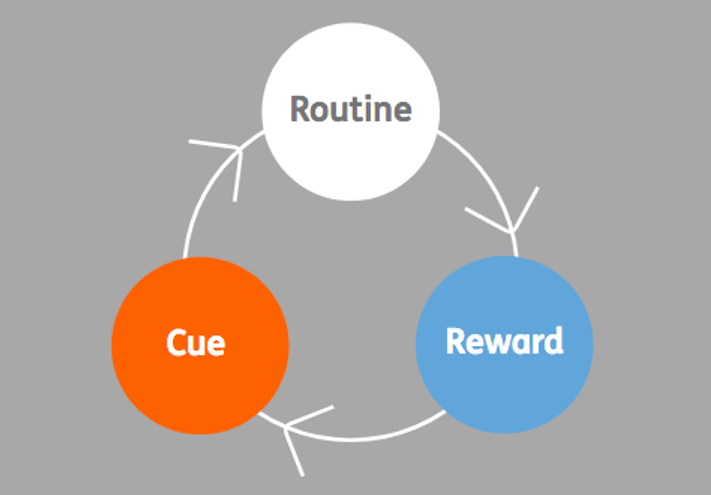Make it happen

Olympic gold medalists are not born stars. The best leaders do not wake up one day knowing what to do to succeed. Change and improvement take time, awareness and consistent effort, and there are certain tools and tips that can help you adopt a new habit or change your routines (whether or not they are related to focus) and make these changes last. In other words, if you find yourself asking “what can help me adopt a new, beneficial behaviour and then turn it into a sustainable habit?”, – then read on.
Strengthen your ‘why’
The very first step in wanting to change anything is having a clear vision of the goal and being fully aware of why it matters to you. This intrinsic ‘Why?’ comes from within you. It is something you want and choose to do, not because you feel obliged to do it; rather because you realize that such a change or new habit will deliver added value.
To identify your intrinsic motivation, it helps to ask yourself the three Why’s. For example, if you want to keep your morning hours to do some serious work that requires your full attention, but end up answering random emails only to find out the morning has passed, ask yourself:
(1) Why do I want to use my focus muscle in the morning hours?
What is in it for me? Answer (for example) – because then I can get the heavy stuff out of the way.
(2) Ask again – why would I want that?
Answer: because I’ll feel relieved that the most demanding job was completed by midday.
(3) Ask yourself one more time – why would I want to feel relieved?
Answer: because I will feel less stressed, be in a better mood and have a sense of achievement in my working day.
This exercise may sound simple, but it pays off to dig in and find the real reason behind your wish. Knowing what we are likely to get out of our actions gives us that extra incentive to actually take them.
-
Read more…
An intrinsic ‘Why’ is an internal conviction that originates from your own free choice. By nature it is therefore a stronger motivator than external pressure or demand from others to make such a change. An internal conviction drives your motivation and give value to your actions. It will help you keep your eyes on your goal, support you progress towards it and remind you why you’re doing what you set out to do.
As an example, if you choose to stop drinking alcohol during the working week because you want to enjoy better sleep, be sharper during working hours and be all together more pleasant towards your colleagues, you are more likely to achieve your goal than if you were told by your spouse or even doctor that your weekday drinking should stop. An intrinsic conviction carries with it the sense of choice – ‘I choose to make this change’, whereas extrinsic pressure from outside (whether active or passive) feels like ‘I have to make this change’ when at the back of your mind you’re likely to be thinking – “I don’t really want to change at all”.
When you have a more profound awareness of how you will benefit meaningfully from specific actions, both in the short and in the long-term, your motivation is more likely to be fired up. For example, when you realize how much more focused and effective you become by leaving the mobile phone in another room, and how this makes you more content and relaxed when sitting down to the family dinner at the end of the day, the chance that you will stick to this new morning routine will increase.
Knowing why you want to clear the morning for effective work, knowing what deeply drives the need for calm, concentrated work time and what your true purpose is behind it (e.g. being a more relaxed and enjoyable part of the team or the family), is more likely to motivate you to stick with the new habit even when temptation calls to sneak in just a couple of short morning calls…
Reward the experience
As humans are reward-driven, just like Pavlovian animals, in fact. This may be disappointing to read if you consider yourself an entirely rational person, but the fact remains that we are more likely to change or perform when we know or feel that our effort will be rewarded. Rewards, too, can be intrinsic – something you desire and decide to give to yourself once you achieve a certain goal; or extrinsic – rewards that result from the very habit you decided to adopt.
Intrinsic rewards in particular are powerful tools, because they strengthen your motivation to repeat the behavior in the future. As an example, say you decide to reward yourself with a 10-minute break over your favorite, aromatic coffee at the end of a focused block of work. Experiencing this immediate, much desired reward helps create a powerful ‘habit-loop’.
In his best-selling book “The Power of Habit”, Charles Duhigg shows that habits generally follow this cycle.

This cycle is rooted in our physiology: receiving a reward triggers the pleasure hormone dopamine. Pleasure feels good, so we seek to experience it again. Result? We repeat the behaviour in anticipation of the reward. So powerful does dopamine appear to be, that even the very thought that you’re about to receive a reward can trigger intense feelings of pleasure, thereby reinforcing your motivation to repeat the reward-awarding behavior. This is called the “Motivation feedback loop”.
-
Read more…
Habits are automatic cue-routine-reward loops that save time and effort. The moment the new changes you decided to introduce become automatic and require little thought or effort, is the moment your new changes turn into routine habits that are more likely to endure. Habits stick because they create a craving for the reward(s) that accompanies them. For example, answering emails as soon as they come in can give the pleasurable (and rather addictive) feeling of ‘items ticked off the to-do list’.
Up to 50% of your daily actions are governed by habits. The more you can rely on your routines, the less brainpower you need to execute your behavior, eliminating unnecessary decision-making processes and depending much less on your willpower and motivation. Many high performers rely heavily on their habits as an energy management strategy – it frees up thinking and action power for those areas where thought and action are truly needed.
Make it easy
An effective way to make your changes less dependent on your ability to execute is to make the steps you decided to take smaller; in fact, preferably ridiculously easy. In the scientific study of habit formation, any obstacle that stands between you and your goal is called ‘friction’. Reducing friction means reducing or removing such obstacles, thereby reducing the effort and making the creation of a new habit easier to achieve. Ask yourself, ”what would make it easier for me to do this? So easy, in fact, that I won’t have to think twice about it?”
Here are a few examples, suitable for the current times.
- Send one short text message a day (WhatsApp or sms) to a teammate as a way of connecting on an informal basis. The current digital environment often means calls and online meetings go ‘straight into business’, and many miss the office chitchat as you pass by a colleague’s desk or meet them by the coffee machine. You may find yourself wanting to say a quick ”Hi, how are you?” but dislike the idea of sitting through yet another online, on-screen chat, however brief. A spontaneous short WhatsApp or text message creates a moment of friendly connection, yet takes only a few seconds to write, with minimal effort on your part. Easy.
- Or send one to a client – clients are human, too! They are also sitting at home, feeling disconnected from their teams and experiencing loneliness as much as anyone else. Surprise one client a day with an informal message, kindly inquiring how they are, with no hidden agendas. It’s the equivalent of a warm handshake or hug and will take less than a minute of your time.
- Plan one minute of movement per hour to get the blood circulating and the muscles working a bit. We all know of course that going out for a daily walk or doing a daily work-out is best, but pandemic necessities and limitations mean that for many, such daily habits are nearly impossible. The kids may be home-schooling, the gym is closed, you may need to stay home. Make it simple! Set your alarm to XX:59 and sprint as fast as you can, on the spot, for one minute only. You’re guaranteed to increase your heart rate, feel lighter and warmer and maybe even have a big grin on your face.
- Write ‘Three Good Things’ – With colleagues now being less accessible and a feeling of isolation affecting many of us, any negative events or disappointments at work may weigh on you heavier than they would in normal times, when you could spontaneously discuss the issue with your colleagues and hopefully get the necessary support. To give yourself the necessary support, take two minutes at the end of each day and write down in a journal three things you did well during the day, however small. Make sure you list three different things every day. The inner critic in us tends to list all the things we did not do, or did not do well enough, during the day. Spend just a couple of minutes a day reinforcing what went right by way of self-support. If you prefer an app to help you do that, check out Three Good Things (iOS or Android).
- Start every call/online meeting with a couple of relaxed, informal questions to your teammates – people miss the informal chatting that happens spontaneously in an office setting, while the coffee is brewing or the photocopier is busy doing its job. Make a conscious attempt to create such moments before delving right into business talk. Think of an original question or two to pose at the start of an online meeting (”give me an original idea for a quick dinner!”; ”anyone surprised their partner in a fun way?” ; ”can anyone recommend a seriously good film?” ; ”where shall we go dining when this is all over?”) and create a more friendly feel with minimum effort. Lost for ideas? Google up ‘ice-breaker questions’ (such as these) for extra inspiration.
- Accept imperfection. The perfectionist in you may resent the simplicity and ease in forming a new habit, demanding instead that you do it longer, harder, better. Given the abundant challenges and restrictions we all face now, tune your mindset to ‘not perfect is good enough’. At other, more comfortable times you may want to push harder. Right now, reassure yourself that any improvement you can achieve, however tiny, is better than none.
Repeat, repeat, repeat
When it comes to execution, frequency is king. Two thousand years ago Aristotle already noted, “We are what we repeatedly do. Excellence, then, is not an act, but a habit”. Doing a little, many times over beats one big burst once in a while.

The amount of time it takes for a repeated task to become automatic (a habit) changes greatly between people: in one British study it ranged from 18 to 254 days, with the median being 66 days. However much time repetition takes to become a habit, there is no question that it cements the new way we have chosen to do things. Repetition builds familiarity and familiarity grows into automation.
When building a new habit is important to you, optimize for what will actually make you succeed—repetition and momentum. Remove all obstacles so as to minimize the excuses you can give yourself for not performing your new habit. Focus on execution and repeat the execution again and again.
It may help to ask yourself the following question: “what is the critical action I need to repeat, in order to build a habit that’s important to me?” The answer will make it easier to identify and cut out the obstacles—usually prep work—that keep you from actually getting started and maintaining momentum.
Let’s look at a few examples.
- Want to build better connections?
Instead of tidying up your contacts list, start sending one contact email (not work related) a day, simply reaching out to someone. Do it as the first email of the day, when you’re already sitting at your desk, by your computer, Outlook open and keyboard ready. - Care to make someone’s day?
Send one email or WhatsApp message a day complimenting a teammate, colleague or client or thanking them for the pleasure of working with them. Hook this small act of kindness to your first cup of coffee or tea of the day, or, better still, every cup of coffee during the day. Make coffee (or tea) synonymous with kindness. The more coffee (or tea), the more kindness. - Want to become a better listener?
In a meeting or discussion allow yourself three to four sentences to bring up a theme, discuss or respond to it, and then consciously stop talking. This prevents you from being a one-way sender and leaves space for another to respond and for you to listen. When it’s your turn to answer, repeat the action: limit yourself to a few sentences, then deliberately stop and take a deep breath. By consciously and repeatedly limiting your own talk, you train yourself to be more tuned to what others have to say.
Every new habit requires focus, and in the ‘Focus’ block we mentioned some rituals that create a task-oriented mindset. By their very nature, repetitive rituals are mini habits, and they further help anchoring the new habit we wish to establish. - Interested in creating a dedicated focused-work time block?
Apart from constant incoming emails, the mobile phone is the biggest distractor during a working day. Mark the start of a task-dedicated time block by leaving your phone (turned to silent) in another room, and close the door to that room. Repeat the action every time you want to have an un- or less interrupted time. Since we tend to be glued to our mobile phone, you may forget this simple action the first few times. Practice makes perfect! Hook the repetitive act of leaving the phone physically away to the conscious act of ‘full attention to the task at hand’ time. With enough repetitions, a new connection will be made in your brain between phone away equals focus.
How to help people change their behaviour is a tricky science, affected by many factors. Although it is challenging to come up with a steel-cut formula that ensures the successful creation of new habits, some common strategies – such as making the change extremely easy and repeating the new behaviour over and over again – appear to work well across the range. Whether you wish to improve your focus or create more meaningful connections, give these strategies a try. We hope they will help you on the path to better mental and emotional wellbeing.